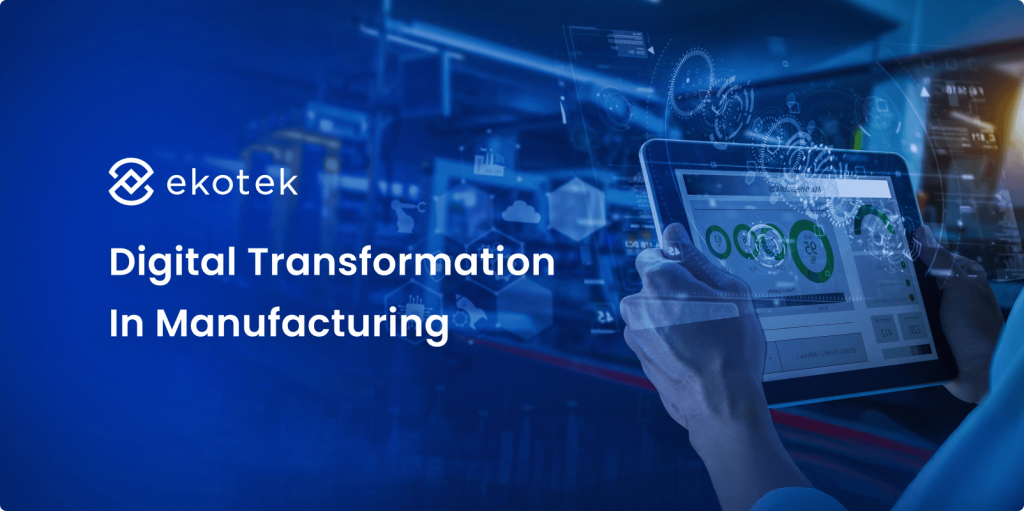Introduction
The manufacturing industry is facing unprecedented challenges, from global supply chain disruptions and rising production costs to growing customer demands for customization and sustainability. A 2024 Deloitte report shows that over 70% of manufacturers cite supply chain instability and labor shortages as top risks. Traditional methods and legacy systems can no longer keep up with these pressures. Digital transformation in manufacturing, the integration of technologies like AI and cloud computing, is now essential for enhancing operational efficiency, reducing costs, and building future-ready production environments. In this guide, we explore how manufacturers can successfully embrace this transformation to stay competitive.
What is digital transformation in manufacturing?
Digital transformation in manufacturing is the fundamental rethinking and redesign of manufacturing processes and business models through the strategic use of digital technologies. It goes beyond simply digitizing manual tasks. It involves creating connected, intelligent production environments where data flows seamlessly across machines, systems, and people. This transformation allows manufacturers to monitor operations in real time, predict maintenance needs, optimize supply chains, and adapt quickly to changing market demands, ultimately driving greater efficiency, quality, and competitiveness.
⭐️ You might be interested in Digital transformation in banking
Key drivers of digital transformation in manufacturing

Productivity and cost reduction
Manufacturers today face relentless demands to increase production efficiency while keeping costs under control. According to McKinsey, digital transformation initiatives can reduce manufacturing costs by up to 30% and improve equipment effectiveness by 20-30%. By implementing technologies such as predictive maintenance and real-time production monitoring, companies can minimize downtime, optimize resource usage, and significantly lower operational expenses.
Growing demand for quality and customization
Modern consumers expect not just mass production, but tailored products delivered quickly and reliably. A Deloitte survey found that 36% of consumers are interested in personalized products or services, putting pressure on manufacturers to offer mass customization without sacrificing quality. Digital tools such as AI-driven quality control and flexible manufacturing systems allow companies to adapt to these expectations at scale.
Escalating global competition
The globalization of supply chains has heightened competitive pressures. Many leading manufacturers in Asia, Europe, and North America are already deploying Industry 4.0 technologies to gain a competitive edge. Companies unable to adopt similar innovations risk losing market share.
For example, Siemens has used digital twins and automated systems to accelerate product development cycles and enhance operational efficiency across its global manufacturing sites.
Regulatory compliance and sustainability requirements
With increasing government and consumer focus on environmental responsibility, manufacturers must reduce emissions, waste, and energy use. According to PwC, 43% of industrial companies globally have prioritized sustainability as a key driver for transformation. Technologies like real-time energy management and supply chain traceability systems are helping manufacturers meet stringent environmental regulations and corporate sustainability goals.
Benefits of digital transformation for manufacturers

Optimized supply chains
Real-time data and IoT-enabled tracking give manufacturers full visibility across their supply chains. This reduces delays, minimizes inventory costs, and enables faster response to disruptions, helping companies meet tight delivery deadlines and customer expectations.
Enhanced operational efficiency
Automation technologies, such as robotics and AI-driven process control, eliminate repetitive manual tasks and reduce human error. As a result, production cycles are faster and more consistent, directly improving output and profitability.
Reduced errors and waste
Advanced analytics and machine learning detect anomalies early in the production process. By identifying and correcting issues before they escalate, manufacturers can significantly cut down material waste and production rework costs.
Improved customer satisfaction and product personalization
Digital transformation allows for more flexible production setups, enabling mass customization at scale. Customers benefit from receiving personalized products faster, which strengthens loyalty and gives companies a strong market advantage.
Predictive maintenance and equipment uptime
Sensors and connected devices monitor equipment health in real time. This predictive approach helps manufacturers schedule maintenance before breakdowns occur, reducing costly unplanned downtimes and extending asset life.
Key technologies driving digital transformation in manufacturing

Industrial Internet of Things (IIoT)
The Industrial Internet of Things (IIoT) connects machines, devices, and sensors across the production floor, creating a network that collects and shares data in real time. This visibility allows manufacturers to monitor processes continuously, detect inefficiencies, and act immediately to prevent costly disruptions.
For example, GE has successfully used IIoT to improve predictive maintenance, leading to significant reductions in unplanned downtime and maintenance costs. By analyzing performance data, they can service equipment before failures occur, improving both productivity and reliability.
Artificial intelligence and machine learning
Artificial intelligence (AI) and Machine learning (ML) are transforming manufacturing by providing advanced data analysis and decision-making support. These technologies enable factories to optimize production schedules, predict equipment failures, and automatically adjust processes to maintain quality standards.
Siemens has adopted AI-driven quality control systems that analyze production data in real time to detect defects. This proactive approach helps reduce waste, minimize rework, and ensures that products meet strict quality requirements.
⭐️ You should get an insight into How Much Does AI Cost in 2025
Robotics and automation
Robotic automation has revolutionized repetitive and hazardous manufacturing tasks. Robots deliver consistent speed and precision, allowing human workers to focus on more complex and strategic activities. This leads to safer workplaces and improved overall productivity.
BMW has integrated collaborative robots (cobots) on their assembly lines to assist workers with physically demanding tasks. This combination of human expertise and robotic precision has reduced ergonomic injuries and streamlined production workflows.
Digital twins and simulation
A digital twin is a virtual model of a physical object or process that enables manufacturers to simulate, monitor, and optimize operations in real time. It offers valuable insights for design, maintenance, and process improvements before real-world implementation.
BMW has leveraged digital twin technology to simulate and refine their assembly lines before actual construction begins. This has dramatically reduced setup times and allowed engineers to foresee potential bottlenecks or errors early in the planning stage.
Cloud and edge computing
Cloud computing provides scalable storage and computing power that manufacturers can access on demand, reducing the need for heavy in-house infrastructure. Edge computing complements this by processing data closer to production equipment, improving response times and reducing data transfer delays.
PPG Industries transitioned over 70% of its manufacturing systems to the cloud, which enhanced operational agility and reduced IT maintenance costs. Combining cloud and edge solutions has allowed them to gain real-time insights and make faster production decisions.
Cybersecurity for connected factories
As manufacturers become increasingly reliant on connected devices and data flows, cybersecurity becomes critical. Protecting intellectual property, operational data, and customer information from cyber threats is essential to avoid costly disruptions and reputational damage.
Strong security measures, such as encrypted communication and multi-layered network protection, ensure the resilience of connected factories. Manufacturers who invest in cybersecurity infrastructure build trust with customers and safeguard their competitive advantage in an increasingly digital landscape.
Challenges and barriers to digital transformation

High upfront investment costs
One of the most common obstacles for manufacturers is the significant capital investment required to implement digital technologies. From purchasing advanced equipment to integrating software platforms and training staff, the initial costs can be daunting, especially for small and mid-sized companies.
However, these investments often yield long-term savings through reduced downtime, improved efficiency, and lower maintenance costs. Forward-thinking manufacturers increasingly view digital transformation as a strategic necessity rather than a discretionary expense.
Lack of skilled workforce
The shift toward smart manufacturing demands new skill sets in data analysis, AI, and cybersecurity. Many manufacturers face a skills gap, with existing employees lacking the knowledge to operate and maintain complex digital systems.
To address this, companies must invest in workforce development programs and continuous learning initiatives. Partnerships with universities and training providers can also help bridge the gap and prepare employees for the demands of digital operations.
⭐️ You may think of IT outsourcing to bridge the skills gap in your in-house team
Integration with legacy systems
Manufacturers often operate legacy machinery and software that were never designed to connect with modern digital platforms. Attempting to integrate these outdated systems with new technologies can lead to compatibility issues, increased costs, and project delays.
A structured digital transformation strategy can minimize these risks. Many companies start with pilot programs or targeted upgrades that gradually modernize their operations without the need for a full system overhaul at once.
⭐️ Explore how Ekotek helped a logistics company migrate from their existing cargo management system to the latest one with real-time cargo tracking
Data privacy and cybersecurity concerns
The rise of connected devices and data-driven operations exposes manufacturers to heightened cybersecurity threats. Unauthorized access, data breaches, and ransomware attacks can cause severe financial and reputational damage.
To protect their assets, manufacturers must prioritize cybersecurity from the start of any digital transformation initiative. Implementing robust encryption, access controls, and regular security audits is an essential step to safeguard sensitive data and maintain operational integrity.
How to start your digital transformation journey

1. Define clear business objectives
The first step in any digital transformation effort is to establish clear, measurable business goals. Whether it’s reducing production costs, improving product quality, or enhancing supply chain visibility, having well-defined objectives will guide your technology investments and ensure alignment across teams.
2. Assess current capabilities
Before investing in new technologies, manufacturers must evaluate their current operations and technology infrastructure. This assessment identifies gaps and helps determine whether existing systems can be integrated with new digital tools or if modernization is necessary.
3. Develop a digital transformation roadmap
A structured roadmap lays out the sequence of technology adoption, resource allocation, timelines, and expected outcomes. This helps manage risks, keep stakeholders aligned, and ensure steady progress toward achieving business goals.
4. Consider outsourcing if in-house transformation is challenging
Outsourcing can provide manufacturers with access to specialized expertise and resources that may not be available internally. This allows companies to focus on core operations while leveraging external partners for complex digital transformation projects.
Partnering with experienced providers can be a smart strategy. Ekotek offers comprehensive digital transformation services tailored to the manufacturing sector. From strategy development and technology integration to ongoing support, Ekotek helps businesses accelerate their journey while minimizing risks and costs.
⭐️ You will need our guide for a software outsourcing vendor evaluation
5. Invest in employee training and foster a digital culture
Technology alone won’t drive transformation; your workforce must be ready to adopt and maximize the tools provided. Invest in employee training and create a culture that encourages innovation, experimentation, and continuous improvement.
6. Pilot small-scale initiatives first
Before committing to full-scale deployments, manufacturers should test new technologies on a smaller scale. These pilot programs allow companies to measure success, identify unforeseen issues, and refine processes before larger investments are made.
7. Continuously monitor and optimize
Digital transformation is an ongoing journey, not a one-time project. Manufacturers must continuously monitor performance, gather data, and optimize processes based on insights. Regular evaluations ensure that the digital strategy remains aligned with changing market demands and business priorities.
Conclusion
Digital transformation is revolutionizing the manufacturing industry, offering enhanced efficiency, quality, and competitiveness. While the journey presents challenges, the benefits far outweigh the obstacles.
Ekotek stands out as a trusted partner in this endeavor, specializing in software development and digital transformation across various sectors, including manufacturing, retail, and banking. We provide tailored consulting, DX product development, and continuous support to ensure that advanced technologies like blockchain, AI, and IoT are seamlessly integrated into your operations. With a strong track record of success and the agility to adapt to your business needs, Ekotek is committed to helping you navigate the complexities of digital transformation.
Ready to elevate your manufacturing operations? Contact Ekotek today to start your journey toward a more innovative and efficient future.


